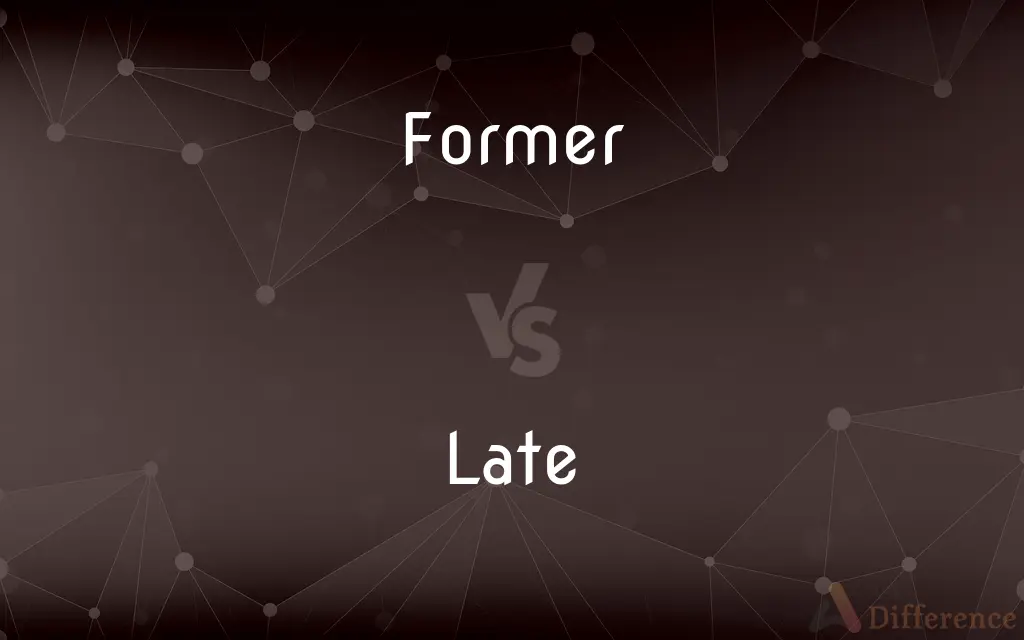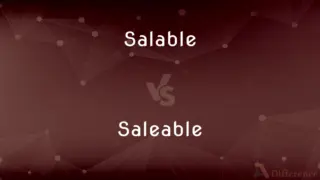Former vs. Late — What's the Difference?
Edited by Tayyaba Rehman — By Fiza Rafique — Updated on April 24, 2024
"Former" refers to someone or something that used to hold a certain position or status, while "late" is used to denote someone who has passed away.

Difference Between Former and Late
Table of Contents
ADVERTISEMENT
Key Differences
The term "former" is used to describe a previous state, position, or condition of an individual, place, or thing. For instance, a "former president" refers to someone who once held the presidency but no longer does. Conversely, the adjective "late" is typically used to describe someone who has died, often mentioned in the context of their prior roles or positions, such as "the late artist."
While "former" indicates a change from a past condition or role to a new one, it does not imply the end of life, just the end of a particular role or phase. On the other hand, "late" explicitly acknowledges death, adding a nuance of respect and remembrance to the mention of the deceased person's name.
In terms of usage, "former" is often paired with titles and roles to denote that the individual is alive but no longer holds that specific position. This helps in distinguishing between current and past holders of a position without implying anything about their mortality. Whereas, "late" is used before a person’s name to indicate that they have passed away, ensuring that the conversation acknowledges their death respectfully.
The application of "former" is broader, extending beyond individuals to include places, objects, or conditions that have changed form or function. For example, one might refer to a building as the "former courthouse" when it has been repurposed. "Late", however, is exclusively used in reference to deceased individuals, underscoring its specific and sensitive context.
Recognizing when to use "former" or "late" is crucial in communication, particularly in formal or sensitive contexts. Using "former" incorrectly can lead to confusion about the status or position of a person or thing, while inappropriate use of "late" can cause emotional distress or disrespect.
ADVERTISEMENT
Comparison Chart
Definition
Referring to something that was but no longer is.
Referring to someone who has deceased.
Usage
Can apply to persons, places, or things.
Exclusively used for deceased persons.
Context
Denotes change in role or state.
Indicates death, adds a respectful tone.
Example
Former CEO, former capital.
The late Queen, the late Mr. Smith.
Implication
Transition or change in status.
End of life.
Compare with Definitions
Former
Preceding in order; earlier.
His former suggestion was more feasible.
Late
Used before a person’s name to indicate they have passed away.
The book was dedicated to the late Dr. Hansen.
Former
Pertaining to an earlier time or condition.
We visited our former home.
Late
Having recently died.
The late actor was beloved by many.
Former
Previously holding a particular position or status.
She is the former CEO of the company.
Late
Implying the recent passing of an individual.
Her work continues to honor her late husband.
Former
The first of two mentioned.
Between coffee and tea, the former is my favorite.
Late
Mentioning after death with respect.
The painting was completed by the late artist.
Former
Old or previous form or state.
The park was a former industrial site.
Late
Respectfully referring to the deceased.
The late mayor’s policies are still in effect.
Former
A former is an object, such as a template, gauge or cutting die, which is used to form something such as a boat's hull. Typically, a former gives shape to a structure that may have complex curvature.
Late
Coming, occurring, continuing, or remaining after the correct, usual, or expected time; delayed
A late breakfast.
A late meeting.
Former
One that forms; a maker or creator
A former of ideas.
Late
Occurring at an advanced hour, especially well into the evening or night
A late movie on television.
The late flight to Denver.
Former
A member of a school form
A fifth former.
Late
Of or toward the end or more advanced part, as of a period or stage
The late 19th century.
A later symptom of the disease.
Former
The first of two persons or things mentioned
"The army was pulling itself together, the government was coming apart. The success of the former was continually imperiled by the failure of the latter" (Garry Wills).
Late
Having begun or occurred just previous to the present time; recent
A late development.
Former
Relating to or taking place in the past
In former times.
Late
Contemporary; up-to-date
The latest fashion.
Former
Having been so in the past
A former ambassador.
His former boss.
Late
Having recently occupied a position or place
The company's late president gave the address.
Former
Being the first of two mentioned.
Late
Dead, especially if only recently deceased
In memory of the late explorer.
Former
Previous.
A former president;
The former East Germany
Late
After the expected, usual, or proper time
A train that arrived late.
Woke late and had to skip breakfast.
Former
First of aforementioned two items. Used with the, often without a noun.
The former is a good idea but the latter is not.
We have two cars, a red one and a blue one. We won the former on a game show.
Late
At or until an advanced hour
Talked late into the evening.
Former
Someone who forms something; a maker; a creator or founder.
Dave was the former of the company.
Late
At or into an advanced period or stage
A project undertaken late in her career.
Former
An object used to form something, such as a template, gauge, or cutting die.
The brick arch was built using a wooden former.
Late
Recently
As late as last week he was still in town.
Former
Someone in, or of, a certain form (class).
Late
Near the end of a period of time.
It was late in the evening when we finally arrived.
Former
One who forms; a maker; a creator.
Late
Specifically, near the end of the day.
It was getting late and I was tired.
Former
A shape around which an article is to be shaped, molded, woven wrapped, pasted, or otherwise constructed.
Late
Associated with the end of a period.
Late Latin is less fully inflected than classical Latin.
Former
Preceding in order of time; antecedent; previous; prior; earlier; hence, ancient; long past.
For inquire, I pray thee, of the former age.
The latter and former rain.
Late
Not arriving until after an expected time.
Even though we drove as fast as we could, we were still late.
Panos was so late that he arrived at the meeting after Antonio, who had the excuse of being in hospital for most of the night.
Former
Near the beginning; preceeding; as, the former part of a discourse or argument.
Late
Not having had an expected menstrual period.
I'm late, honey. Could you buy a test?
Former
Earlier, as between two things mentioned together; first mentioned.
A bad author deserves better usage than a bad critic; a man may be the former merely through the misfortune of an ill judgment; but he can not be latter without both that and an ill temper.
Late
Deceased, dead: used particularly when speaking of the dead person's actions while alive. the"; see usage notes.}}
Her late husband had left her well provided for.
The piece was composed by the late Igor Stravinsky.
Former
The first of two or the first mentioned of two;
Tom and Dick were both heroes but only the former is remembered today
Late
Existing or holding some position not long ago, but not now; departed, or gone out of office.
The late bishop of London
The late administration
Former
Referring to the first of two things or persons mentioned (or the earlier one or ones of several);
The novel was made into a film in 1943 and again in 1967; I prefer the former version to the latter one
Late
Recent — relative to the noun it modifies.
Former
Belonging to some prior time;
Erstwhile friend
Our former glory
The once capital of the state
Her quondam lover
Late
(astronomy) Of a star or class of stars, cooler than the sun.
Former
(used especially of persons) of the immediate past;
The former president
Our late President is still very active
The previous occupant of the White House
Late
(informal) A shift (scheduled work period) that takes place late in the day or at night.
Former
Of the distant past;
The early inhabitants of Europe
Former generations
In other times
Late
After a deadline has passed, past a designated time.
We drove as fast as we could, but we still arrived late.
Late
Formerly, especially in the context of service in a military unit.
Colonel Easterwood, late of the 34th Carbines, was a guest at the dinner party.
The Hendersons will all be there / Late of Pablo Fanque's Fair / What a scene!
Late
Not long ago; just now.
Late
Coming after the time when due, or after the usual or proper time; not early; slow; tardy; long delayed; as, a late spring.
Late
Far advanced toward the end or close; as, a late hour of the day; a late period of life.
Late
Existing or holding some position not long ago, but not now; recently deceased, departed, or gone out of office; as, the late bishop of London; the late administration.
Late
Not long past; happening not long ago; recent; as, the late rains; we have received late intelligence.
Late
Continuing or doing until an advanced hour of the night; as, late revels; a late watcher.
Late
After the usual or proper time, or the time appointed; after delay; as, he arrived late; - opposed to early.
Late
Not long ago; lately.
Late
Far in the night, day, week, or other particular period; as, to lie abed late; to sit up late at night.
Late
Being or occurring at an advanced period of time or after a usual or expected time;
Late evening
Late 18th century
A late movie
Took a late flight
Had a late breakfast
In the middle years
In his middle thirties
Late
After the expected or usual time; delayed;
A belated birthday card
I'm late for the plane
The train is late
Tardy children are sent to the principal
Always tardy in making dental appointments
Late
Of the immediate past or just previous to the present time;
A late development
Their late quarrel
His recent trip to Africa
In recent months
A recent issue of the journal
Late
Having died recently;
Her late husband
Late
Of a later stage in the development of a language or literature; used especially of dead languages;
Late Greek
Middle English is the English language from about 1100 to 1500
Middle Gaelic
Late
At or toward an end or late period or stage of development;
The late phase of feudalism
A later symptom of the disease
Later medical science could have saved the child
Late
(used especially of persons) of the immediate past;
The former president
Our late President is still very active
The previous occupant of the White House
Late
Later than usual or than expected;
The train arrived late
We awoke late
The children came late to school
Notice came so tardily that we almost missed the deadline
I belatedly wished her a happy birthday
Late
To an advanced time;
Deep into the night
Talked late into the evening
Late
At an advanced age or stage;
She married late
Undertook the project late in her career
Late
In the recent past;
He was in Paris recently
Lately the rules have been enforced
As late as yesterday she was fine
Feeling better of late
The spelling was first affected, but latterly the meaning also
Common Curiosities
How is "late" used when speaking about someone?
"Late" is used before the name of a deceased person to indicate that they have passed away and to add a note of respect.
What is the difference between "former" and "ex-"?
"Former" is generally less formal and can imply a more recent past than "ex-", which often denotes a more definitive or longer past separation.
Why is it important to use "late" correctly?
Using "late" correctly is important as it shows respect for the deceased and accurately communicates their status.
What are synonyms for "late"?
In the context of death, there are few direct synonyms, but "deceased" is a formal alternative.
Can "former" be used for someone who is deceased?
Yes, "former" can be used for deceased individuals when discussing their past positions without specifically referencing their death.
How does "former" indicate time?
"Former" indicates a past condition or role that has since changed but does not specify a precise time frame.
How do "former" and "late" impact formal writing?
Both terms are crucial for clarity and respect in formal writing, especially in historical, biographical, or journalistic contexts.
What does "former" mean?
"Former" refers to someone or something that previously held a position, status, or condition but no longer does.
Is it appropriate to use "late" for someone who died a long time ago?
While typically used for more recent deaths, "late" can be used for anyone who has died, as long as it fits the communicative context and respect is being conveyed.
Does "late" have any other meanings?
In other contexts, "late" can also refer to something happening after the expected or usual time, but in reference to people, it strictly means deceased.
Can "former" refer to objects and places?
Yes, "former" can refer to objects and places, indicating their previous function or form.
What are synonyms for "former"?
Synonyms include "past", "previous", and "one-time".
How can the misuse of "former" or "late" affect communication?
Misuse can lead to confusion, incorrect information, or disrespect, particularly in sensitive or formal contexts.
Can "former" and "late" be used together?
Yes, they can be used together when referring to someone who has died and also to denote their past position, e.g., the late, former president.
What should one be cautious of when using "late"?
It is important to be sensitive and accurate, ensuring that the person referred to has indeed passed away and that the context calls for this respect.
Share Your Discovery

Previous Comparison
Salable vs. Saleable
Next Comparison
Oval vs. OvularAuthor Spotlight
Written by
Fiza RafiqueFiza Rafique is a skilled content writer at AskDifference.com, where she meticulously refines and enhances written pieces. Drawing from her vast editorial expertise, Fiza ensures clarity, accuracy, and precision in every article. Passionate about language, she continually seeks to elevate the quality of content for readers worldwide.
Edited by
Tayyaba RehmanTayyaba Rehman is a distinguished writer, currently serving as a primary contributor to askdifference.com. As a researcher in semantics and etymology, Tayyaba's passion for the complexity of languages and their distinctions has found a perfect home on the platform. Tayyaba delves into the intricacies of language, distinguishing between commonly confused words and phrases, thereby providing clarity for readers worldwide.













































